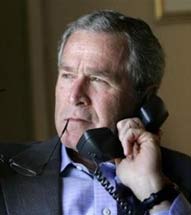NYT: President Bush's 'reset the clock' strategy
 RAW STORYPublished: Friday September 8, 2006
RAW STORYPublished: Friday September 8, 2006Saturday's edition of the New York Times will carry an article slated for the front page which examines President Bush's "reset the clock" strategy.
"When President Bush and his top aides gathered in July to plan a strategy for the fifth anniversary of the Sept. 11 attacks, it was clear to all that they had to try to reset the clock -- back to a time, before Iraq, when portraying Bush as a steely commander in chief was a far simpler task, and before Katrina, when questions about the administration's competence did not weigh so heavily," write David E. Sanger and Sheryl Gay Stolberg.
From those discussions emerged the speeches Bush has delivered over the last week, the leading edge of a remarkably intensive and aggressive campaign in which he has attempted to regain ground he has lost for more than two years, by turning the conversation away from Iraq and back toward the broader war on terror," the article continues.
Excerpts from the Times article:
#
It is a carefully calibrated strategy that will continue in coming days, first with an appearance Sunday morning by Vice President Dick Cheney on NBC’s “Meet the Press,” the vehicle he used to advantage at key moments after Sept. 11 and then Mr. Bush’s appearance that night at ground zero in New York and a prayer service at St. Paul’s Chapel.
On Monday, for the first time since the first anniversary in 2002, Bush will visit all three sites of the attack that remade his presidency -- New York; Shanksville, Pa., and the Pentagon. Then he will cap the day and bring to a close this phase of his effort to portray himself and his party on his terms with a nationally televised speech from the Oval Office.
....
“You can never turn back the clock,” Dan Bartlett, the counselor to the president, said on Friday when asked about the strategy. “But we knew that news organizations and everyone else would be using this moment to define where we were five years later, and the president wanted to articulate his view, too.”
“He’s not trying to ignore Iraq — he wouldn’t, he doesn’t want to,” Mr. Bartlett added. “But he had to explain that even if we have a debate here about whether Iraq’s part of the war on terror, the enemy believes it is.”
#
FULL TIMES ARTICLE CAN BE READ AT THIS LINK




0 Comments:
Post a Comment
<< Home